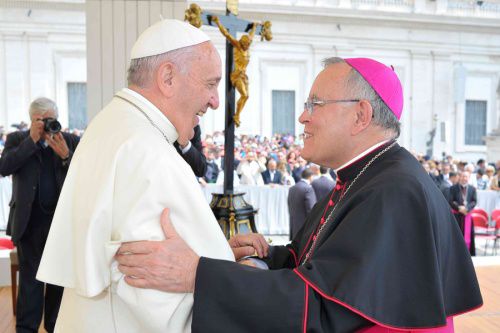True mercy, and trust in the transformative power of God’s grace are key to helping divorced-and-remarried Catholics, Archbishop Charles Chaput of Philadelphia has said in a critique of proposals to admit them to sacramental Communion without a change in their lives. “Ironically, a pastoral strategy that minimizes sin in the name of mercy cannot be merciful, because it is dishonest,” the archbishop said in a December 2015 essay for the U.S. journal First Things. Authentic mercy is evangelical and believes “God’s grace has the power to transform us.” This is relevant to the Church’s pastoral response to the divorced-and-remarried, he maintained. “The divorced and civilly remarried remain welcome members of the believing community. But neither can the Church ignore the Word of God on the permanence of marriage, nor mitigate the consequences of the choices that grown people freely make,” Archbishop Chaput said. The archbishop recounted the Gospel of John’s account of Christ and the woman caught in adultery, who was about to be stoned. All persons need God’s mercy, including those who consider themselves righteous, the archbishop explained. “Only Jesus can free us. Only he could have justly cast the first stone. But he didn’t, saying instead, ‘Neither do I condemn you; go, and do not sin again’.” “God does not owe us forgiveness or redemption—or anything else. Nor does God’s mercy license us to continue in sin,” he said, repeating: “It demands a response to ‘go, and do not sin again’.” “In forgiving the woman, Jesus does by grace what the moral law cannot do. He gives her a new life in God’s friendship,” Archbishop Chaput added. He reflected upon proposals to admit to sacramental Communion divorced-and-civilly-remarried persons who have not made a change to their lives and where annulments “are not deemed possible.” “According to such proposals, couples who are sexually active with people to whom they are not really married in the eyes of the Church might receive the Eucharist even without confession of their sins, and without seeking to be chaste while living as ‘brother and sister’,” he said. Such proposals are advanced as “expressions of mercy” and draw strength from “the fact that many of the people they seek to help are decent, well-intending persons tied to complex new relationships, often with children.” Archbishop Chaput rejected claims that Church practice punishes and excludes those in irregular unions. He said the Church “cannot confirm human beings in patterns of behavior that separate them from God and remain faithful to her own mission at the same time.” The archbishop said Christ’s mercy is not a “judgment against all judgments.” The damage of sin “cannot easily be undone — adultery being a perfect example.” However, the encounter between Christ and the woman is a reminder that “apart from God’s grace, all of us are misshapen by the distorted desires of our hearts.” He said truth is essential to the Sacrament of Reconciliation. When truthfully received, the sacrament is “a steady path to transformation and holiness.” “A sincere movement toward God always entails a movement away from sin and error,” he continued. “The Church can be truthful without being merciful, like the scribes who wished to stone the adulteress who violated the Mosaic law. But the Church cannot be merciful without being truthful.” “A pastoral approach that ignores this truth out of a thinly veiled pastoral despair and accommodationism will result in less faith, not more,” the archbishop said. “What ensues from an untruthful teaching about and practice of the sacraments is not a more zealous evangelical life but its collapse,” he continued, suggesting this has happened in parts of Europe that have departed from Catholic teaching. Archbishop Chaput noted Pope Francis’ exhortation that Christians accompany others in “the tangled realities of their lives.” “This is a key aspect of mercy and a vital expression of Christian love. Sin’s bonds are strong, and God’s grace often unwinds them slowly,” he said. “Sometimes, the most important word that another person needs to hear is best whispered gently and patiently. We must be close to those whom we love if we’re to do our part in lifting them up to the fullness of the Gospel.” The archbishop warned that a “therapeutic age” misunderstands this effort and tries to affirm people “indiscriminately as they are.” “This is not mercy. God’s mercy always moves us forward and upward. No sin places us beyond God’s forgiveness. His mercy endures forever,” he said. He added: “it would be the opposite of mercy to say ‘come’ and then imply that we need not move, need not step out of our present romance with sin and toward obedience to God’s life-giving righteousness, the law of Jesus Christ.” “Christians are sent into the world bearing the imprint of the mercy of the Cross on our lives,” he said. This mercy is the preaching of “the good news of salvation in Jesus Christ.” This is not “affirmation” but something more powerful: redemption. “The Church in this Year of Mercy invites us to encounter anew the love of our Redeemer. She opens her doors to the world and invites all to enter and join the marriage feast of the Lamb,” the archbishop concluded.

